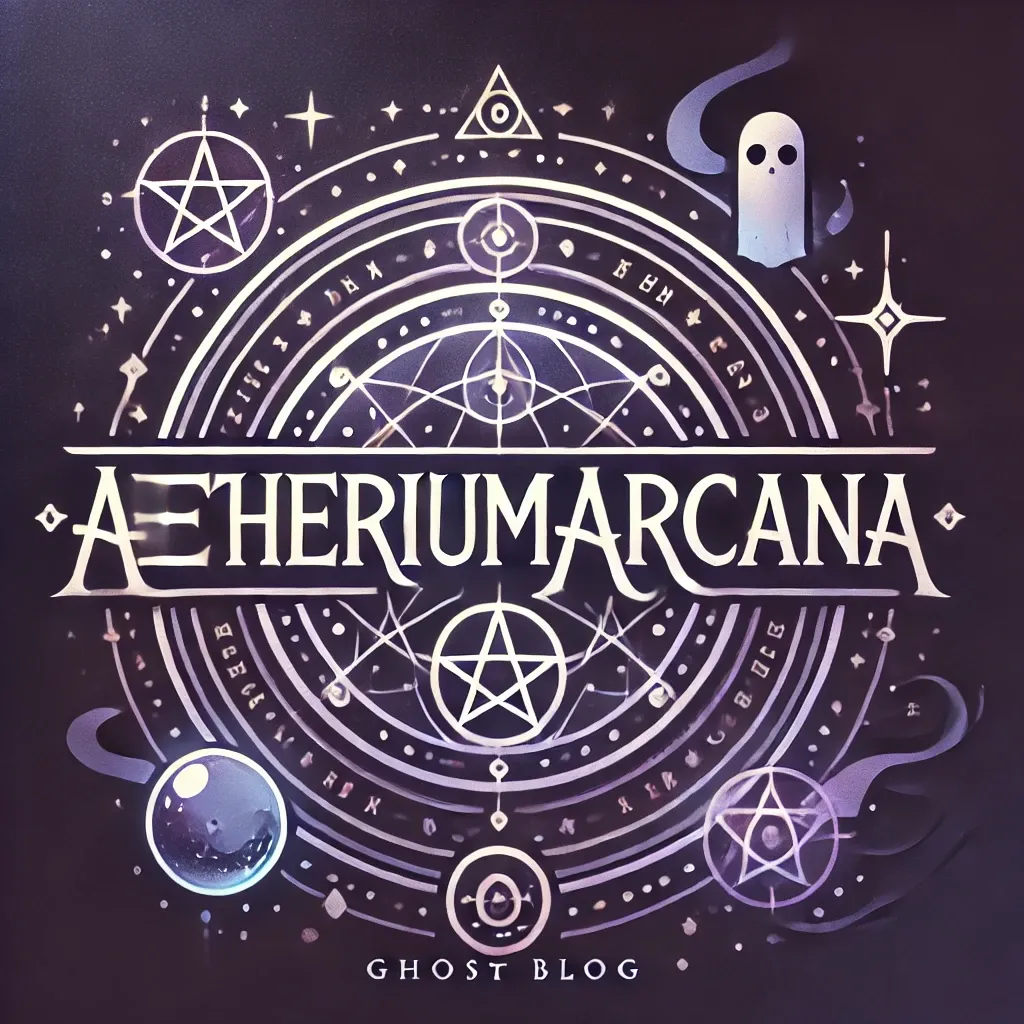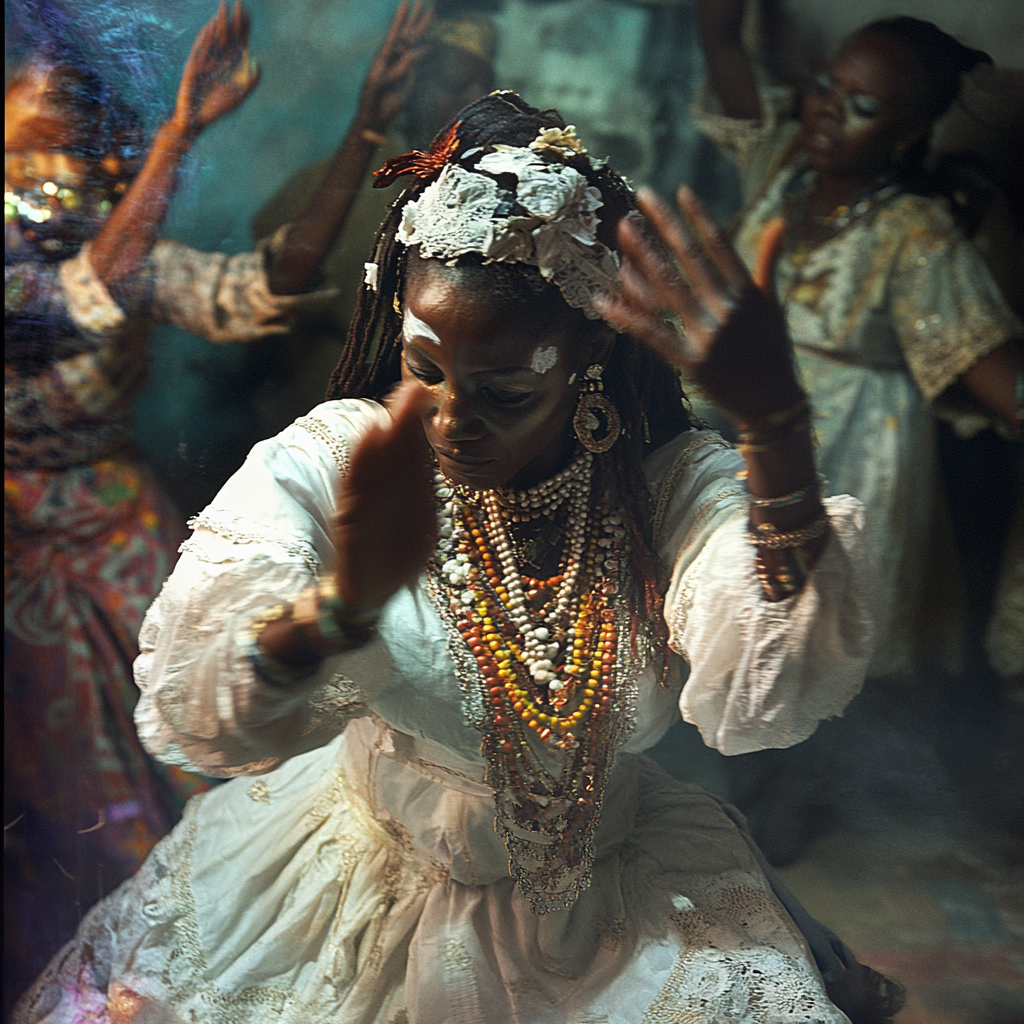In the furnace of slavery, something extraordinary emerged. Across the Caribbean and Latin America, African religious systems not only survived—they flowered. They transformed under pressure, recombined in new ways, and created powerful, living spiritual systems that remain vital today. This section explores the major Afro-diasporic religions that crystallized in the Americas: Vodou in Haiti, Santería in Cuba, Candomblé and Umbanda in Brazil, and others such as Obeah, Myal, and Kumina.
Each of these traditions shares deep African roots, particularly in Yoruba, Fon, and Kongo cosmologies. But they also reflect the specifics of colonization, language, and resistance in their respective regions. They are not carbon copies of African religion—they are new world faiths, shaped by fire, blood, saints, and survival.
We begin where the flame burned brightest: Haiti, the Black Republic born in revolution, where the spirits walk as citizens and the drums still call the old gods.
Vodou as Kreyòl Religion
Vodou (sometimes spelled Vodun, Vodu, or Vaudou) is a Kreyòl spiritual system rooted in the Fon and Kongo traditions, with major Yoruba influence and a long entanglement with Catholicism. It emerged during the French colonial period on the island of Saint-Domingue (now Haiti), under brutal plantation slavery.
The word "Vodou" comes from the Fon word vodun, meaning “spirit” or “deity.” But Vodou is not a frozen remnant of African religion—it is a creolized, dynamic system shaped by hundreds of African ethnic groups, colonial violence, Catholic symbolism, and the experience of resistance.
The Lwa: Spirits That Serve and Speak
At the heart of Vodou is the lwa—spiritual intelligences who act as intermediaries between the human world and the distant, abstract Supreme Being called Bondye (from French Bon Dieu, "Good God").
The lwa are not just gods. They are personalities, forces, ancestors, archetypes, and companions. Each has their own songs, colors, ritual preferences, days of the week, and dance styles. Lwa are divided into nanchons (nations or families), each with distinct temperament and style:
Rada – the cool, ancestral spirits (from Dahomey); associated with order, healing, and stability.
Petwo – the hot, revolutionary, and often dangerous spirits; born in Haiti and linked with fire, iron, and power.
Gede – spirits of death and sexuality; irreverent, funny, obscene, and deeply wise.
Important lwa include:
Legba – guardian of the crossroads, opener of all ceremonies.
Ezili Freda – spirit of romantic love, beauty, and heartbreak.
Ezili Dantò – fierce protector, maternal rage, symbol of Haitian womanhood.
Ogoun – warrior, blacksmith, and general; master of iron and fire.
Baron Samedi – lord of the dead, top-hatted trickster who governs the cemetery.
Papa Gede – spirit of children, death, and mirth, often wearing sunglasses and smoking cigars.
The lwa possess devotees during ritual—speaking, dancing, giving advice, or demanding offerings. They do not stay in the clouds. They come down to ride the bodies of their horses.
Ritual: The Peristyle and the Drum
Vodou is a ritual technology of relationship. Ceremonies take place in a sacred space called the peristyle, with a central poteau mitan (center post) representing the axis between worlds. The ground is marked with veve—ritual drawings made in cornmeal or ash, calling specific spirits.
Drumming, song, and dance summon the lwa. As rhythms intensify, possession begins—individuals fall, convulse, or rise suddenly transformed. The spirit is not metaphorical; it speaks, eats, drinks, and acts through the body.
Offerings are made—flowers, liquor, cooked food, animal sacrifice—according to each spirit's preference. Sacred objects (asson, rattles, charms, baths) play specific roles in cleansing, protection, or healing.
Vodou ceremonies may be open public events or closed initiations, and most serious practitioners are initiated through a series of rites, culminating in the kanzo ceremony, which confers the title of oungan (priest) or manbo (priestess).
Healing, Justice, and Political Power
Vodou is not just religion—it is medicine, protection, justice, and memory. In Haitian communities, the oungan or manbo acts as a healer, counselor, diviner, and ritual leader. Through spiritual baths, herbal remedies, and ritual diagnoses, practitioners address physical illness, psychological distress, and spiritual misalignment.
In times of oppression, Vodou becomes resistance. During the Haitian Revolution, it was the source of unity and empowerment, guiding strategy and giving moral clarity. In contemporary Haiti, it is often a source of grassroots political power, feared by elites and misunderstood by outsiders.
Vodou has no single temple or pope. It is networked, not centralized. Power flows through lineages, initiations, dreams, and spirits themselves.
Misrepresentation and Reclamation
Vodou has long been vilified—by colonial authorities, missionaries, Hollywood, and even Haitian governments. It has been falsely linked to Satanism, zombification, and cannibalism. These tropes have been used to discredit Black sovereignty, justify military intervention, and stigmatize African religion.
But today, many Haitian scholars, practitioners, and artists are reclaiming Vodou as a source of national pride, cultural memory, and spiritual depth. The religion continues to evolve—now practiced in cities, in diaspora communities, and increasingly online.
Conclusion: The Spirits Walk With Us
Vodou is not simply a relic of slavery. It is a living system, built on reverence, reciprocity, and resilience. Its spirits walk with the poor, the exiled, and the broken—but also with those who seek justice, beauty, and ancestral presence. It is a fire that passed through water and did not go out.
From the crossroads of the peristyle to the quiet home altar, from the thunder of Ogoun to the whisper of Papa Gede, Vodou teaches us that the sacred survives not because it hides—but because it dances.
References
Desmangles, Leslie. The Faces of the Gods: Vodou and Roman Catholicism in Haiti. University of North Carolina Press, 1992.
Brown, Karen McCarthy. Mama Lola: A Vodou Priestess in Brooklyn. University of California Press, 1991.
Métraux, Alfred. Voodoo in Haiti. Schocken Books, 1972.
Cosentino, Donald J. Sacred Arts of Haitian Vodou. UCLA Fowler Museum, 1995.
Ramsey, Kate. The Spirits and the Law: Vodou and Power in Haiti. University of Chicago Press, 2011.
Dubois, Laurent. Avengers of the New World: The Story of the Haitian Revolution. Harvard University Press, 2004


Member discussion: